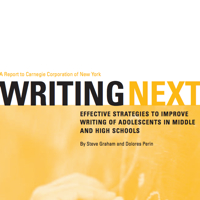Educators have focused on developing reading programs with the assumption that reading and writing are complementary skills.
Writing Next, a recent report by Carnegie Corporation states, “Writing is sometimes seen as the ‘flip side’ of reading. It is often assumed that adolescents who are proficient readers must be proficient writers, too. If this were the case, then helping students learn to read better would naturally lead to the same students writing well. However, although reading and writing are complementary skills whose development runs a roughly parallel course, they do not necessarily go hand in hand. Many adolescents are able to handle average reading demands but have severe difficulties with writing. Moreover, the nature of the relationship between reading and writing skills changes over time (Fitzgerald & Shanahan, 2000). Researchers know that reading and writing often draw from the same pool of background knowledge—for example, a general understanding of the attributes of texts. At the same time, however, writing differs from reading. While readers form a mental representation of thoughts written by someone else, writers formulate their own thoughts, organize them, and create a written record of them using the conventions of spelling and grammar.” Full report here 1.4 MB pdf
New digital technologies give students the opportunity to publish high-quality books under the guidance of their teachers. I am promoting digital publishing at conferences, school-based training and my website Read > Think > Write > Publish. The power of publishing enables students to think like writers, to apply their learning strategies and to organize and express their learning.


